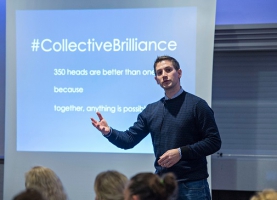Nowadays, as non-traditional teams are becoming more and more commonplace, understanding the dynamics of dispersed teams is paramount. It is no secret that corporations are outsourcing their operations to different countries and investing in expertise located anywhere around the world. This type of behaviour has created a need for geographically dispersed collaboration processes and solutions.
While team members working on the same site may have the advantage over dispersed teams in many aspects, a thoughtful knowledge management process may actually give dispersed teams the upper hand.
Volvo IT - Managing the use of knowledge between teams in...

Posted by TallyFox on 23 January 2017
Breaking silos has always been an interesting topic.
Some knowledge managers believe it to be necessary for knowledge to flourish, but silos are necessary for many organisations as not all information can or should be accessible to everyone.
Silos are often created by the organisations themselves to protect sensitive information and keep their employees focused on their work and away from irrelevant activities that are happening on other projects that can become distractions. Many software development companies understand this need and have created excellent software to enable silos.
However, a lot of valuable knowledge is lost that way...

Posted by TallyFox on 23 January 2017
Knowledge managers often say that a considerable challenge in implementing knowledge management is demonstrating how those investments provide value to the organisation. Many knowledge managers have encountered a skeptical executive or two who, after the KM presentation, leans back in the chair and asks: "Show me the ROI".
How can one measure the ROI of an attitude?
At the beginning of the implementation process, knowledge managers often need to demonstrate the value in order to gain full support from senior management as they need to make investment decisions to fund it and they want to be sure the investment will be worthwhile.
Because of this,...

Posted by TallyFox on 20 January 2017
The English Institute of Sport (EIS) formally invested in Knowledge management after the London Games in 2012 with the appointment of Dr Peter Brown as the Head of Performance Knowledge.
The EIS is one of the world’s largest providers of sport science and sports medicine to Great Britain’s Olympic and Paralympic athletes. EIS has recognised the need to facilitate, capture and exploit the knowledge and expertise of their members, and under the leadership of Dr Peter Brown, has invested a lot of time and effort into a functioning knowledge management process.
The key driver behind the EIS’s KM effort is the ability to connect their teams...

Posted by TallyFox on 17 January 2017
Recognising the need for storing information, collaborating and improving their work, law firms and legal departments started building intranets around 1995. Those early intranets served mostly for storing administrative information and static legal content.
Today, progressive legal organisations are investing in KM and are using portals with dynamic content.
What knowledge management does for legal professionals is to help them capture and reuse their collective wisdom, benefit from their prior work and accumulated expertise in order to solve legal and business issues by making it easier for lawyers to find information and colleagues with expertise....

Posted by TallyFox on 23 December 2016
From ancient times, people have discovered that one of the most effective techniques of transferring knowledge from person to person is to share it in a community, so they started creating communities for people to gather and address issues. The first knowledge networks were organised around a need.
With the expansion of software in general, networks of people are able to communicate and collaborate ‘virtually’ across the world, anytime and anyplace.
One of the examples is certainly The Water Network, an open knowledge sharing network organised around a need to solve the world’s water crisis, as they say: ”One question and answer at a time”....

Posted by TallyFox on 22 December 2016
Scaling the existing customer support model was always a challenge for big businesses, and so was streamlining internal communications in order to keep up with business growth. Merging the two needs together opened a sweet spot to introducing knowledge management into the support systems.
Creating a support network where employees are able to create a community is important for both employees who have access to all the information, and to the customers who have instant access to expertise. We are able to offer this with Tallium. Here’s how a simple question can be solved and create value.
When your customers can easily access answers to their problems, without picking up the...

Posted by TallyFox on 06 December 2016
One of the influencers from the KM industry whose opinion is the most sought after is definitely Stan Garfield. Whether it is given through his Linkedin pulse articles, his Quora answers, his tweets or the content he shares on his personal website, people read what he has to say and they learn from it.
For those who are not acquainted with his story, Stan retired in May after eight years at Deloitte, where he led communities and enterprise social networking.
Prior to that, he spent 25 years at HP, Compaq, and Digital Equipment Corporation. In 1996 he launched Digital's first knowledge management program, helped develop the...

Posted by TallyFox on 25 November 2016
In our recent interview with David Gurteen, a well-known name in the Knowledge Management industry, we spoke about a most discussed topic in Knowledge Cafes, and that was the topic of "Should you reward sharing knowledge in your organisation?". David argued that it does a lot more harm than good, and there is research to support that claim.
In 2005, a survey on Knowledge Sharing and reward was posted on the Gurteen Knowledge website, and the question asked was: “Do you think people should be rewarded for sharing their knowledge?”
Believe it or not, 43% of the voters agreed, and stated that they should be explicitly rewarded. 20% agreed, but noted that it...

Posted by TallyFox on 22 November 2016
Information environments have grown more complex and users expectations have increased. They are no longer happy with their enterprise search software offering results they haven't asked for and leaving out the ones that are relevant.
Search algorithms, regardless of how sophisticated and intelligent they are will never replace the need for a level of structured tagging, i.e. taxonomy.
Autotagging algorithms, if designed to operate without context, are very complex and often not available in many knowledge sharing solutions.
The best course of action is to simplify the taxonomy by organising it based on members’ expertise, using terms...










